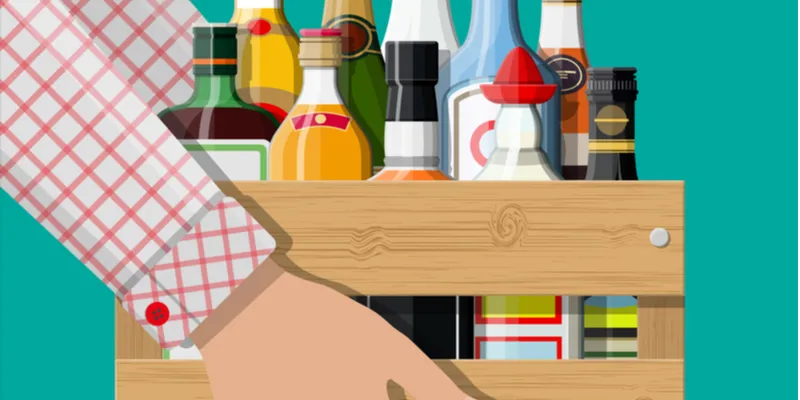How this Mumbai-based alcobev company survived the pandemic amid disruption, rising liquor taxes
Mumbai-based Tilaknagar Industries was founded in 1933 by Mahadev L Dahanukar as Maharashtra Sugar Mills. It entered the distillery division in the 1970s and scaled up to become one of the most prominent liquor brands in India.
The coronavirus pandemic disrupted many sectors, and the Indian liquor industry was no exception. Alcobev companies – right from the top to the bottom of the pyramid – felt the impact.
Global player Pernod Ricard revised its outlook for FY21 in March 2020 and forecasted its profit margins to decline by 20 percent in the wake of the pandemic. Subsequently, when United Breweries Limited (UBL), which is considered to be India’s largest alcobev, company posted its Q1 FY2021 results, the revenue from operations slipped 73 percent to Rs 1,262.82 crore from Rs 4,708.42 crore in the corresponding quarter in FY20.
Another firm that has managed to stay afloat is Tilaknagar Industries. The Mumbai-based alcobev company was founded in 1933 by Mahadev L Dahanukar as Maharashtra Sugar Mills. It entered the distillery division in the 1970s and scaled up to become one of the most prominent liquor brands in India.
Tilaknagar’s most famous offering is brandy, which accounts for about 89 percent of its overall revenues. The company claims that Mansion House Brandy, Courrier Napolean Brandy Green, and Red are some of its most profitable offerings. Apart from brandy, the company also manufactures and sells whiskey, rum, vodka, and gin. In total, the company sells through 15 categories, and its presence goes beyond India to countries like Kenya, Rwanda, Bahrain, Singapore, South Korea, and more.
While COVID-19 disrupted its operations as well, Tilaknagar Industries has been gradually recuperating. In Q3 ended December 2021, the company clocked revenue worth over Rs 501 crore with a profit after tax (PAT) of Rs 9.78 crore. The financial results for FY22 are yet to be released in the public domain.
In an interaction with SMBStory, Amit Dahanukar, Managing Director of the National Stock Exchange-listed company, says that while the company is recovering from the pandemic and its effects, threats such as taxation and rising cases of COVID-19 continue to loom over the company and the industry at large.
Looking back
When the pandemic struck, the first quarter of FY21 was a complete washout for the company. The catastrophic second wave made matters worse.
In FY21, the sales declined by 15.31 percent from 64.4 lakh cases a year to 54.54 cases, and the company’s revenues declined from Rs 652.82 crore in FY20 to Rs 548.78 crore in FY21.
Amit says that in the wake of COVID-19, the company did not retrench any of its employees and made significant changes like working from home in the company’s day-to-day operations.
In addition, the pandemic saw several alcohol companies pivoting into making sanitisers out of alcohol. Amit, however, has a different take on this.
“There was a lot of demand for sanitisers but we were very clear that we didn’t want to focus too much on it,” he says, adding that the objective was to divert the production into sanitizers for social objectives only.
“I did not want to build a separate vertical out of it. So we shipped whatever units we were able to produce.”
Amit also highlights that COVID-19 brought down the overall demand but it also increased home consumption of alcohol, as a result of which the demand for big bottles increased and those with lower quantities reduced.
Taxes
Excise duties levied by the state governments are a big challenge in the industry. Moreover, different taxation policies in different states often make selling liquor cases a challenging endeavour for any company. In FY21, Tilaknagar Industries paid a whopping Rs 244 crore as excise taxes.
Amit says that taxation within the liquor industry needs to be studied more deeply. He believes that balance is needed in terms of taxation. He further adds, “Usually the government increases the taxes rapidly in the hope of culling out more revenue. That doesn't necessarily happen because, at some point, the demand goes down.”
He says that this has happened in regions like Andhra Pradesh where there was a “sharp increase in taxation” and as a result, the “business shrunk.” According to him, a rational approach to taxation can be a win-win situation for everyone. On the other hand, there are governments like Telangana which have reduced the excised duty and as a result, the sales have gone up and the government has made more revenue.
Amit says that if the government increases the tax, then the manufacturers also must be allowed to increase the price of the product to sell to the end consumer.

On startups emerging in the space
According to a report by the Indian Council for Research on International Economic Relations (ICRIER), India is one of the fastest-growing alcoholic beverages markets globally, with an estimated market size of $52.5 billion (about Rs 3.9 lakh crore). The market is expected to grow at a CAGR of 6.8 percent by 2023.
The last few years have also seen a trend of several startups and small businesses emerging in this space, producing cocktails, mocktails, craft beer, and more. Moreover, a lot of innovation is owed to the changing consumer palates and the inclination towards sustainability and the utilisation of natural ingredients.
Amit says that while there is a lot of “buzz on social media” what needs to be seen is how these companies fare in the next five or 10 years in terms of contributing to the overall volumes and profitability in the industry. “How much potential do they have to move the needle? That’s a key question that needs to be answered,” Amit adds.
Amit also adds that the pandemic has resulted in two major trends – online delivery of liquor and demand for products in premixes and cocktail space.
What's next?
The last two years have been eventful for Tilaknagar Industries. Now, all eyes are on the road ahead. The company is looking at expanding to regions within the eastern part of the country.
The company, which is known for producing quality brandies, also offers flavoured brandies. The brand wants to establish a deeper connection with the youth. Recently, Delhi-based Fratelli Wines also introduced wines in cans as a way to reach out to a wider range of young consumers.
“Flavoured brandy is a new category and it should make consumption of brandies a little more fun. We are hoping for the youngsters to buy it too as it blends well with mixed drinks, cocktails, etc,” Amit signs off.
Edited by Kanishk Singh









